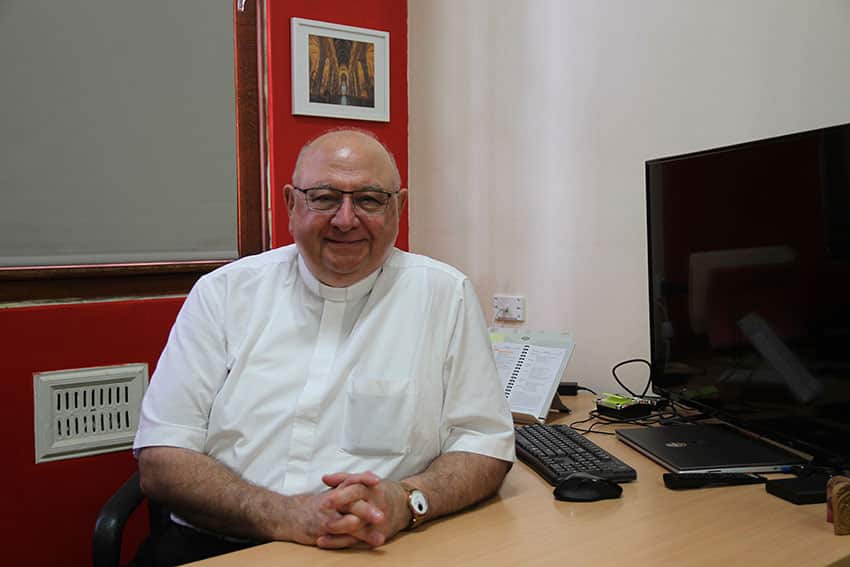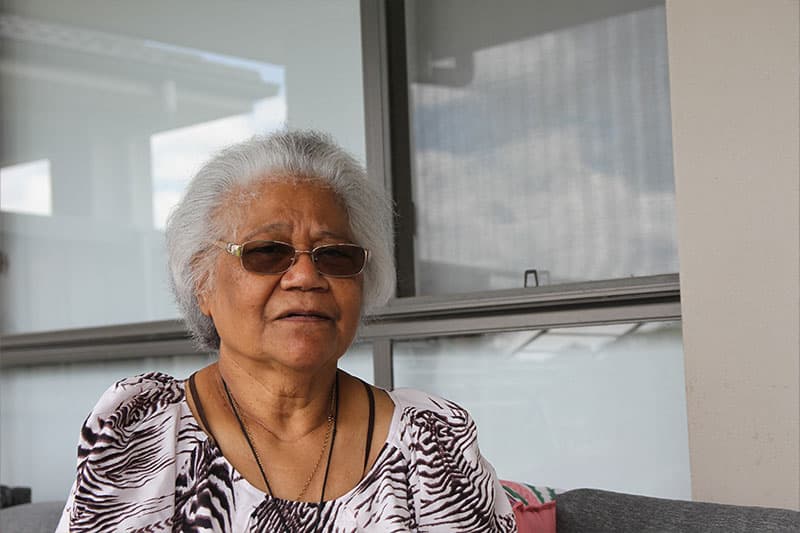
“At 9am the helicopters started hovering. They’d hover for the next hour, hour and a half, spotting people.
“It was the very first time I thought, ‘Here I am celebrating Mass and I’m fearing being arrested.’ This would happen in Communist China, not in a country where we’re free.”
As NSW reopens after two years of on-again, off-again public health measures, and the world’s attention shifts to new variants of COVID-19, the suburb at the epicentre of the 2021 Delta outbreak is still reeling from the effect of lockdowns.
Strict lockdowns
From July 2021, Fairfield local government area was subject to some of the strictest measures anywhere in the world: mandatory testing for residents working outside the LGA, strict stay-at-home orders and curfews.
The deployment of soldiers, alongside a hefty police presence, drew incomprehension from overseas as well as deep unease among some sectors of the community, who alleged discrimination against working-class migrant communities.
Fr Bob Bossini, administrator of Our Lady of the Holy Rosary, Fairfield, observed the effects of the lockdown up close.

Heightening the fear
His congregation, one of the most diverse in the country, reflects the makeup of Fairfield itself: Vietnamese, Samoans, Assyrians, Chaldeans and many other nationalities, many of them descended from refugees and asylum seekers.
“The fact that you saw armed police and soldiers in battle fatigues, not armed, but significantly present, in a population here that came from countries where the army – and even the police, anyone in uniform – wasn’t friendly. It just heightened that whole fear,” Fr Bossini told The Catholic Weekly.
A major COVID-19 testing centre was set up at the RSL across the street from Fr Bossini’s parish, a large complex adjacent to Fairfield town centre.
Economic impacts
Mandatory testing only worsened the sense of anxiety; the kilometres-long queue outside the testing centre would be abruptly cut off at 9.30pm, with residents being told to come back the next day.
“A lot of the companies outside the LGA were saying, we’re not hiring people from Fairfield [because of the uncertainty],” Fr Bossini said.
Anna Batur, a parishioner at Our Lady of the Holy Rosary, said her family was still struggling as a result of the public health orders.
“My son lost his job. He’s a plumber, just finished his apprenticeship. He wasn’t allowed to go into TAFE or finish his exams. Some of them were practical work,” Batur said.
Families bore brunt
“My husband’s got Parkinsons and my eldest [son] had a stroke – he’s not even aware there was COVID.
“I lost my father last year. The hell we went through trying to get a priest in to a hospital!
“It was tough on the family and the youngest, he wasn’t allowed to go and even say goodbye. I wasn’t allowed to go and see him.”
“It was tough on the family and the youngest, he wasn’t allowed to go and even say goodbye. I wasn’t allowed to go and see him.”
Breakdown in government-faith relations
Situations like Anna’s were common during the lockdowns, and “yet people could come into the government area without being tested,” Fr Bossini said.
The interface between government and religious leaders, who have deep roots in the community, left much to be desired.
Despite reports, Fr Bossini told The Catholic Weekly that the parish had no liaison from any level of government during the pandemic.
Consultation? What consultation?
“What was coming out from the media was ‘After consultation with community leaders.’ Must have been non-religious community leaders. We received nothing. It just happened. Very little was coming from the council in terms of support, it was all: you can’t do this, you can’t do that,” Fr Bossini said.
Two NSW health officials checked the parish for compliance with QR codes, sanitiser and social distancing between the 2020 and 2021 lockdowns – the parish’s only contact.
Fr Bossini attempted to contact members of Fairfield council through parishioners to discuss the pandemic response, describing local government as “defensive” during the lockdowns. Juliette Kirkwood, a psychotherapist who works in Fairfield and Liverpool as part of CatholicCare’s parish program, also described a lack of on-ground engagement from government.
Money doesn’t fix the problems
“I would agree with Fr Bob – there wasn’t any effort,” she said.
“And I don’t think it’s a lack of wanting, it’s a lack of understanding what the community needs.
“There were lots of grants flying around here and there – it was really just the only answer they had, was money. Giving somebody $600 is not going to solve the problem of isolation, fear, anxiety, depression. It’s not going to solve that problem.” Kirkwood described a situation where a refugee family with a single computer might be trying to conduct remote learning for their children on smartphones.
The parents and grandparents may lack email addresses or basic computer literacy skills themselves, making applying for grants almost impossible.

Going ‘mental’
“Accessing [government support] is complicated, even for people like me working in the system,” Kirkwood said. “Often times when people want help, or they’re struggling, one of the first places they go is to the parish priest.
“It’s great to have a social worker on hand to deal with these things, and free the priest up to deal with spiritual matters.”
Matilda Petersen, a member of the Fairfield Parish Council, contracted COVID-19 during the Delta wave.
“When I got sick I thought, this is why people go mental!” she said.
“I was lying there, listening to the whistling of the birds and the planes going over, the helicopter. It was like a war.”
Discrimination?
Petersen, a diabetic, recovered from COVID-19 but was unable to eat or drink for days.
She thinks the public health controls were discriminatory, and have introduced division into the community.
“I think we were very discriminated against. Every news that comes on, it’s always Fairfield, south west Sydney,” she said.
“This is worse than a leper colony. I worked in a leper colony when I was 18!”
Restricting the faith outreach
Her sister also caught COVID-19. “When she got it, she cried … She thought she’d brought it home,” she said. Without the Church, Petersen is convinced she wouldn’t have survived the illness. “Archbishop Fisher needs to know that if it wasn’t for Fr Bob and Fr Andrew we wouldn’t have come through,” she said.
Fr Bossini exposed the Blessed Sacrament in the church window, and parishioners prayed the rosary outside during the lockdowns, wearing masks and socially distanced.
Anna Batur agrees: “Our parish community was so helpful. Mentally it was so helpful, being supported.”
Nevertheless, key services like the Vinnies office were unable to operate during lockdown, despite enormous demand.
“Normally [clients] ring the head centre if they want something and then we go and visit and give them a voucher. We used to do food, now they go out and buy it,” Petersen said.
“During the lockdown we couldn’t do it.”
Turning those on the margins away
Batur said there was an increased number of people asking for food at the parish, but many had to be turned away.
“We had to direct them elsewhere – the office was closed here. They’d be around the gates, it was horrible to see,” she said.
Fr Bossini and Kirkwood are both convinced that the full effects of the 2021 Delta wave are yet to be seen. “We kept pushing the line that there’s a whole spiritual, mental thing that’s going to happen. And we haven’t seen the start of it,” Fr Bossini said.
He worries that the increasingly tense and moralistic debates over public health controls and vaccination status are splitting families.
Splitting families
“This thing, when it breaks out, you’re looking for a group of people to blame.”
“People have come to see me, grandparents – their kids saying, ‘You’re not vaccinated, therefore you’re not seeing the grandkids.’ Family reunions aren’t happening.”
Even though some public health controls have been eased, fear and anxiety are still at a fever pitch – with the new Omicron variant keeping the tension high.
Kirkwood agrees: “It’s not until they know the pandemic is over in some way … it’s going to take [people] a while to relax.
“They can’t relax, they can’t trust, because at any moment things could be closed or shut down.
“It’s definitely better than it was – they’re coming out of it slowly – but it’s nowhere near where it needs to be, for their nervous system to settle down. They’re still hyper-vigilant.”
Are you still recovering from the 2021 lockdowns? Contact us on: [email protected]
Related
- Lockdown sparked mental health crisis (this will be the link to Adam’s second story)
- Syro-Malabar Catholics take advantage of lockdowns
- Maronite mum: managing the juggling act under lockdown
